
Robert Dennis Crumb is an American cartoonist who often signs his work R. Crumb. His work displays a nostalgia for American folk culture of the late 19th and early 20th centuries, and satire of contemporary American culture.
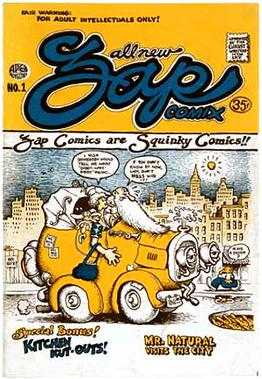
Underground comix are small press or self-published comic books that are often socially relevant or satirical in nature. They differ from mainstream comics in depicting content forbidden to mainstream publications by the Comics Code Authority, including explicit drug use, sexuality, and violence. They were most popular in the United States in the late 1960s and 1970s, and in the United Kingdom in the 1970s.

Zap Comix is an underground comix series which was originally part of the youth counterculture of the late 1960s. While a few small-circulation self-published satirical comic books had been printed prior to this, Zap became the model for the "comix" movement that snowballed after its release. The title itself published 17 issues over a period of 46 years.

Gilbert Shelton is an American cartoonist and a key member of the underground comix movement. He is the creator of the iconic underground characters The Fabulous Furry Freak Brothers, Fat Freddy's Cat, and Wonder Wart-Hog.

Kitchen Sink Press was a comic book publishing company founded by Denis Kitchen in 1970. Kitchen Sink Press was a pioneering publisher of underground comics, and was also responsible for numerous republications of classic comic strips in hardcover and softcover volumes. One of their best-known products was the first full reprint of Will Eisner's The Spirit—first in magazine format, then in standard comic book format. The company closed in 1999.
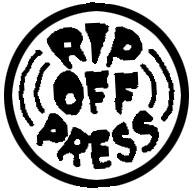
Rip Off Press Inc. is a comic book mail order retailer and distributor, better known as the former publisher of adult-themed series like The Fabulous Furry Freak Brothers and Rip Off Comix, as well as many other seminal publications from the underground comix era. Founded in 1969 in San Francisco by four friends from Austin, Texas — cartoonists Gilbert Shelton and Jack Jackson, and Fred Todd and Dave Moriaty — Rip Off Press is now run in Auburn, California, by Todd.

Jay Patrick Lynch was an American cartoonist who played a key role in the underground comix movement with his Bijou Funnies and other titles. He is best known for his comic strip Nard n' Pat and the running gag Um tut sut. His work is sometimes signed Jayzey Lynch. Lynch was the main writer for Bazooka Joe comics from 1967 to 1990; he contributed to Mad, and in the 2000s expanded into the children's book field.
Jay Kinney is an American author, editor, and former underground cartoonist. Kinney has been noted for "adding new dimensions to the political comic" in the underground comix press of the 1970s and '80s.

Angelfood McSpade is a comic book character created and drawn by the 1960s counter culture figure and underground comix artist Robert Crumb. The character first appeared in the Philadelphia-based underground newspaper Yarrowstalks #2 in July 1967, making her comics debut in the second issue of Zap Comix.
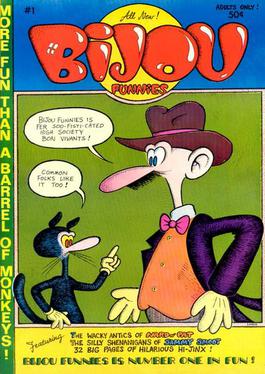
Bijou Funnies was an American underground comix magazine which published eight issues between 1968 and 1973. Edited by Chicago-based cartoonist Jay Lynch, Bijou Funnies featured strong work by the core group of Lynch, Skip Williamson, Robert Crumb, and Jay Kinney, as well as Art Spiegelman, Gilbert Shelton, Justin Green, and Kim Deitch. Bijou Funnies was heavily influenced by Mad magazine, and, along with Zap Comix, is considered one of the titles to launch the underground comix movement.

Donald Richard Donahue was a comic book publisher, operating under the name Apex Novelties, one of the instigators of the underground comix movement in the 1960s.
Gary Edson Arlington was an American retailer, artist, editor, and publisher, who became a key figure in the underground comix movement of the 1960s and 1970s. As owner of one of America's first comic book stores, the San Francisco Comic Book Company, located in San Francisco's Mission District, Arlington's establishment became a focal point for the Bay Area's underground artists. He published comics under the name San Francisco Comic Book Company, as well as publishing and distributing comics under the name Eric Fromm. Cartoonist Robert Crumb has noted, "Gary made a cultural contribution in San Francisco in the late 1960s, through the '70s, '80s & '90s that was more significant than he realizes."
Leonard Rifas is an American cartoonist, critic, editor, and publisher associated with underground comix, comics journalism, left-wing politics, and the anti-nuclear movement. He is notable for his contributions to the form of minicomics as well as publishing Japanese manga in the United States. Rifas' publishing company, EduComics, operated most actively from 1976 to 1982.

Armageddon is a 1972–1974 underground comic title published by Last Gasp. Written and illustrated by Barney Steel, the comic expressed an anarcho-capitalist philosophy, influenced by Ayn Rand, and explored sociopolitical themes.

Slow Death is an underground comix anthology published by Last Gasp, the first title published by the San Francisco Bay Area-based press. Conceived as an ecologically themed comics magazine, the title's "underlying theme was always about what the human race was doing to damage the native planet." Frequent contributors to Slow Death included Greg Irons, Jaxon, Dave Sheridan, Richard Corben, Jim Osborne, Tom Veitch, and Dennis Ellefson. Released sporadically from 1970 to 1992, 11 issues were published in all.
Willy Murphy was an American underground cartoonist. Murphy's humor focused on hippies and the counterculture. His signature character was Arnold Peck the Human Wreck, "a mid-30s beanpole with wry observations about his own life and the community around him." Murphy's solo title was called Flamed-Out Funnies; in addition, he contributed to such seminal underground anthologies as Arcade, Bijou Funnies, and San Francisco Comic Book, as well as the National Lampoon.
Keith Green was an American publisher, distributor, and art dealer. Starting out in the late 1960s as an underground comix distributor, in the early 1970s, he published comics, and by the mid-1970s he had become a New York City art dealer. He was the younger brother of cartoonist Justin Green.
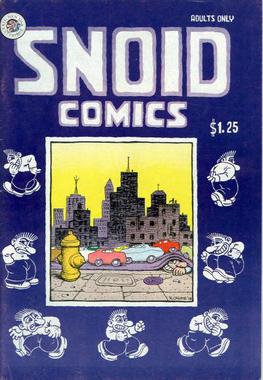
The Snoid, occasionally referred to as Mr. Snoid, is an American underground comix character created by Robert Crumb in the mid-1960s. A diminutive sex fiend and irritating presence, the Snoid often appears with other Crumb characters, particularly Angelfood McSpade, Mr. Natural, and Crumb's own self-caricature.

The People's Comics is a single-issue underground comic book drawn and written largely by Robert Crumb, with a young Harvey Pekar writing a back cover feature. The book is notable for containing the death sequence of Fritz the Cat following Crumb's disappointment with Ralph Bakshi's 1972 film involving the character.
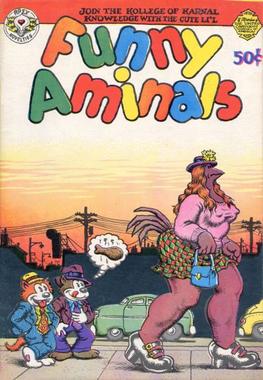
Funny Aminals is a 1972 single-issue anthology underground comic book created by Robert Crumb and a collection of other artists. The work is notable for containing the first published version of Art Spiegelman's Maus, though the version that ran in Funny Aminals was aesthetically and thematically different from the series Spiegelman would publish in Raw Magazine and as a standalone book.














